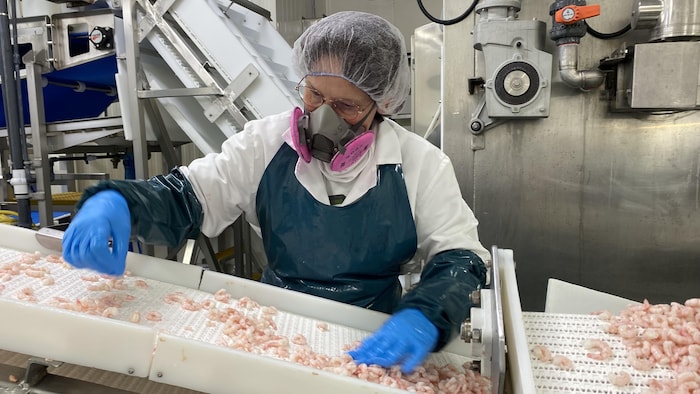An important page in the economic history of the Acadian Peninsula turns in Lamèque.

Open in full screen mode
A woman works in a shrimp processing plant. (Archive photo)
Radio-Canada
Voice synthesis, based on artificial intelligence, makes it possible to generate spoken text from a written text.
The last factory in New Brunswick that processed shrimp, the Coopérative des Pêcheurs de l'Île à Lamèque, ceases to operate do so due to the unprecedented crisis hitting the industry.
Low shrimp quotas – approximately 750 tonnes in New Brunswick – make it no longer profitable for this plant to continue these activities.
For the company's president, Hector Chiasson, it's the end of an era.
We were forced to announce to members that we are no longer operating the shrimp factory in Lamèque, given the situation prevailing in the shrimp fishing industry. , he explains.
Hector Chiasson is president of the Fishermen's Cooperative in Lamèque. This plant was the last to process shrimp in New Brunswick.
In the good years, between approximately 2008 and 2015, the Coopérative des Pêcheurs de l& #x27;Île could process between 12 and 15 million pounds of shrimp per year.
Loading
Ottawa and Quebec conclude an agreement in principle on health transfers
ELSE ON NEWS: Ottawa and Quebec conclude an agreement in principle on health transfersLoading in progress
Ottawa and Quebec reach an agreement in principle on health transfers
ELSEWHERE ON INFO: Ottawa and Quebec reach an agreement in principle on health transfers
Since then, these quantities have greatly decreased. Last year, the plant processed just 2.5 million pounds of shrimp.
The company recently improved its lobster processing facilities. She will also continue to process crab. But she will inevitably have to adapt to this new reality.
Workers will also have no choice but to accept this decision. About 70 employees, most from the region, will work fewer hours, fewer weeks.
I don't know how it's going end the season, because the workers who are going to work this year do not work long, estimates Hector Chiasson.
The processing plant of the Fishermen's Cooperative 'Island, in Lamèque. (File photo)
Citizens met in Lamèque are of the opinion that this will have a significant impact in the region.
A lot, a lot, a lot. Oh yes, [it will affect] a lot of people. I know a lot of women. The children fish and then they become very discouraged, says Lucette Savoie.
It's cut on all edges: the crab, the shrimp, everything is cut. The groundfish, everything is cut. The work is starting to be rare in this section here. There are a lot of people who won't get their unemployment either, adds Édouard Caissie.
It will affect jobs. People are already having trouble finding weeks to earn their unemployment benefits. It's certain that it will surely affect the economy too, believes Carole Noël-Basque.
President Hector Chiasson is also very criticism of the management of the Department of Fisheries and Oceans. He doesn't see things getting better in the short term for the local economy.
But there, if it continues to lower prices quotas, in snow crab, and in lobster, and there are no more shrimp, and there are no more of this and that, it can become quite complicated.
Based on a report by René Landry

